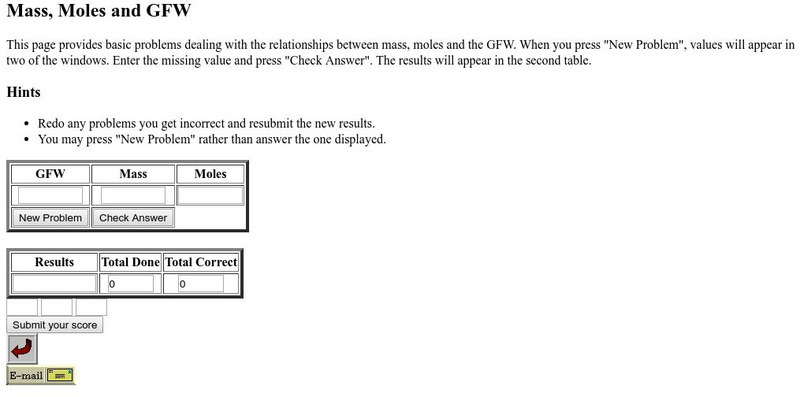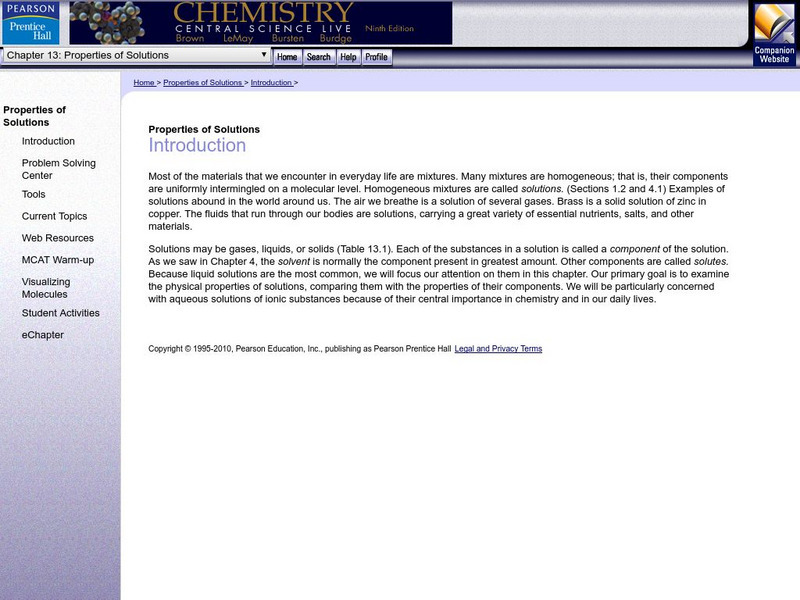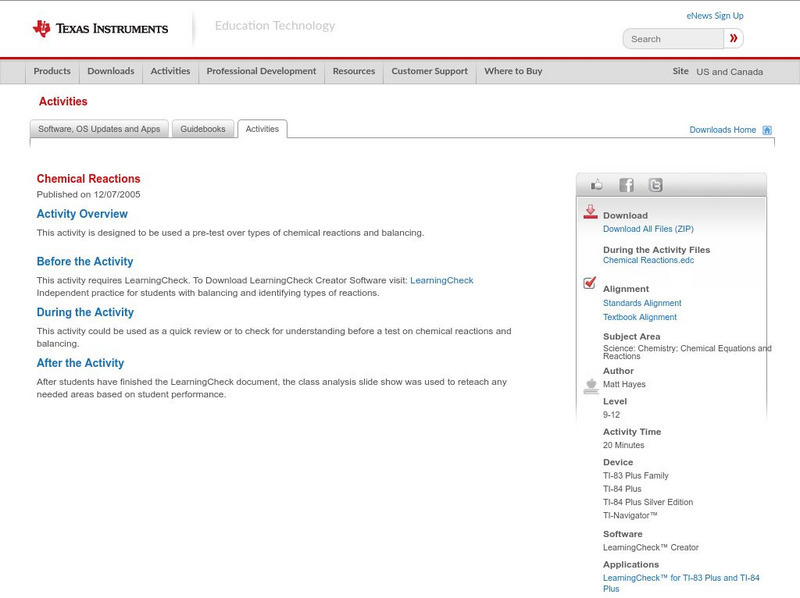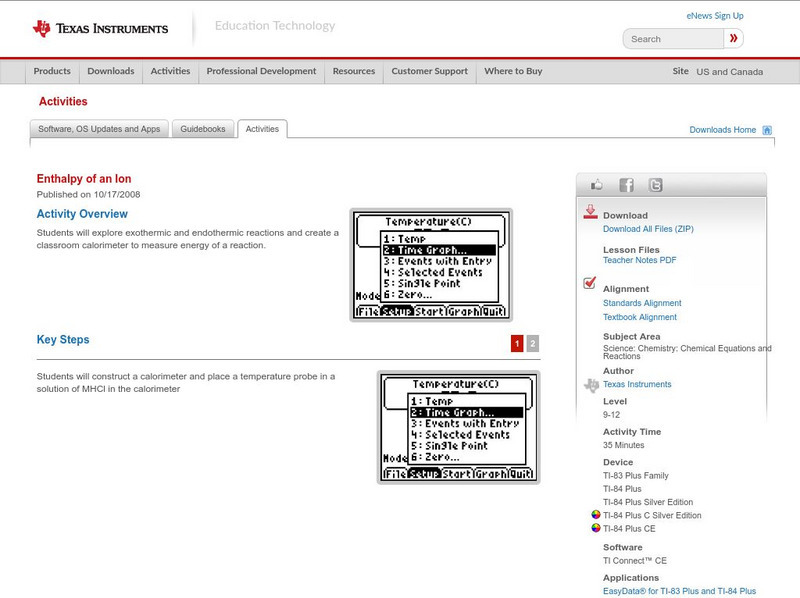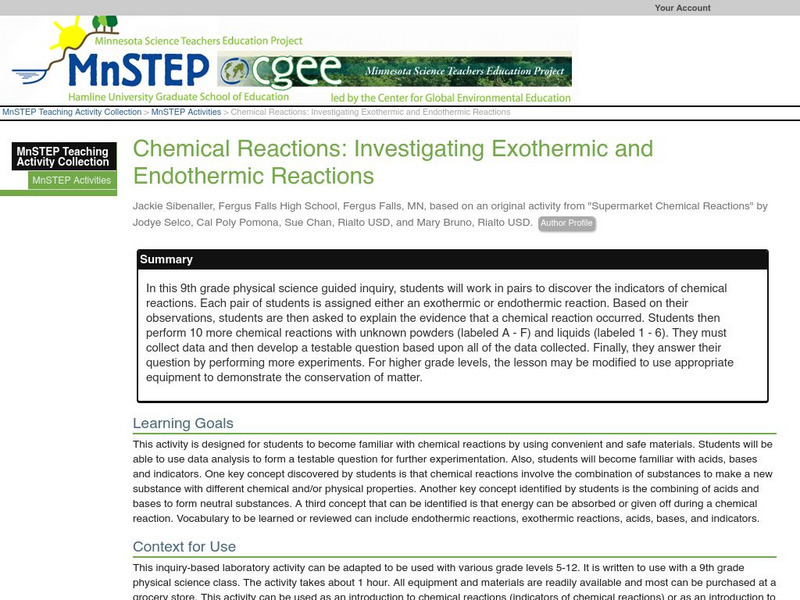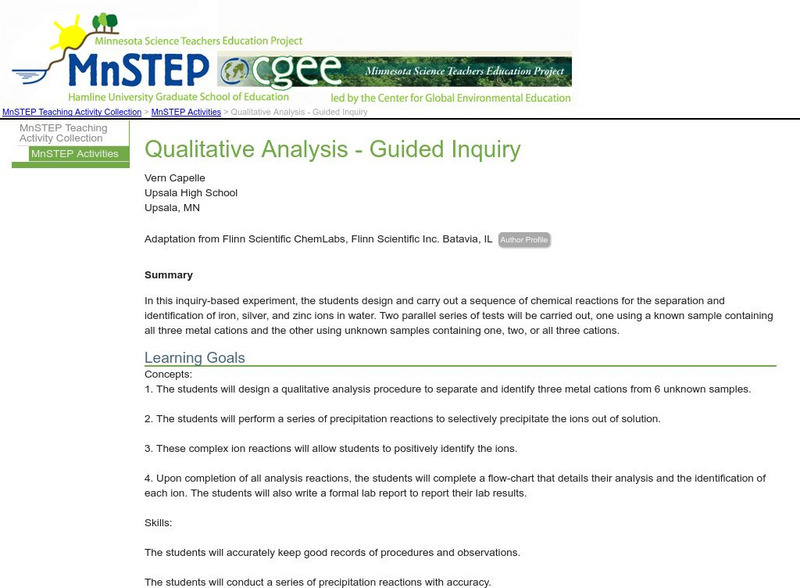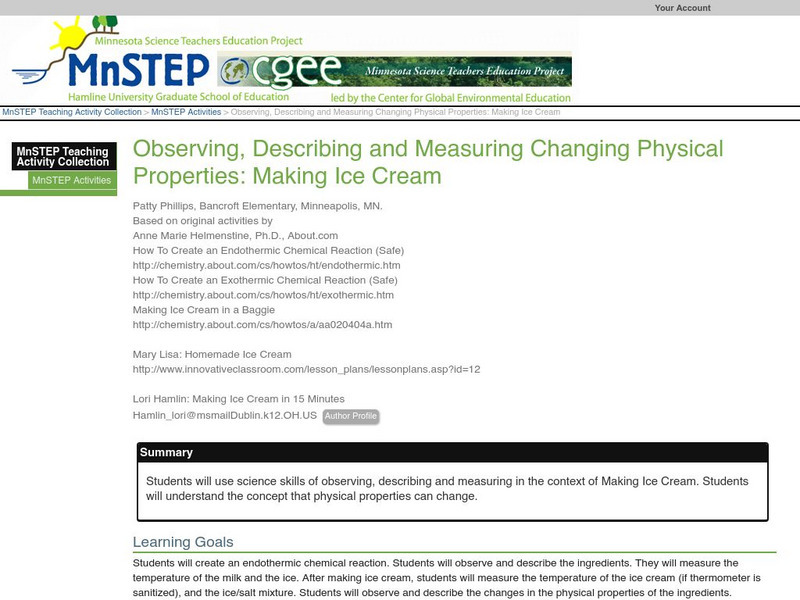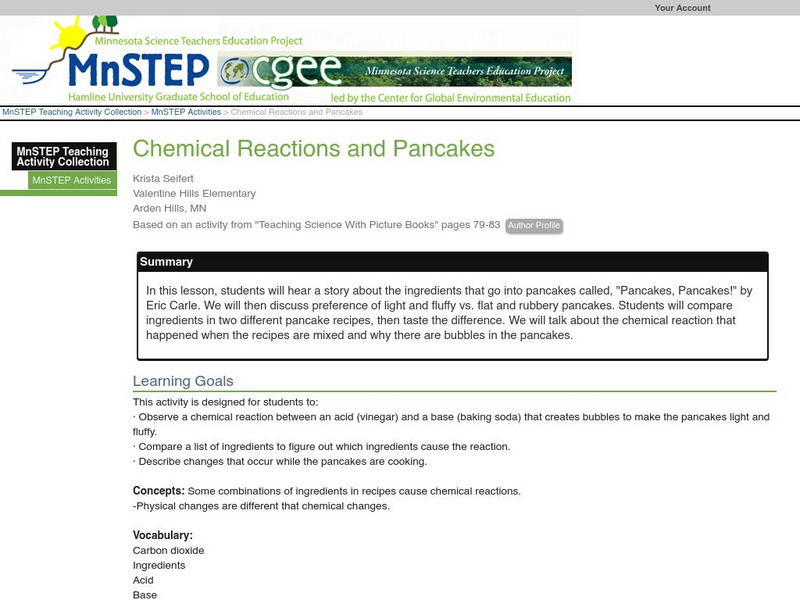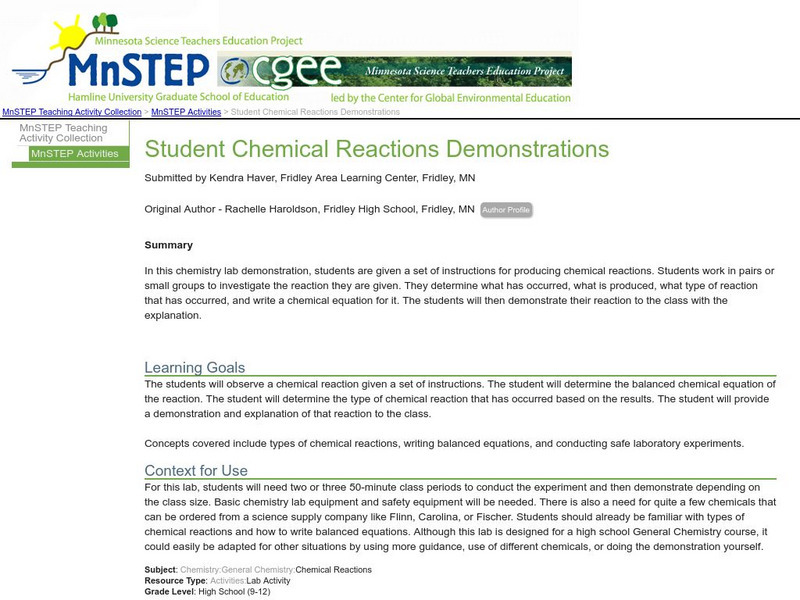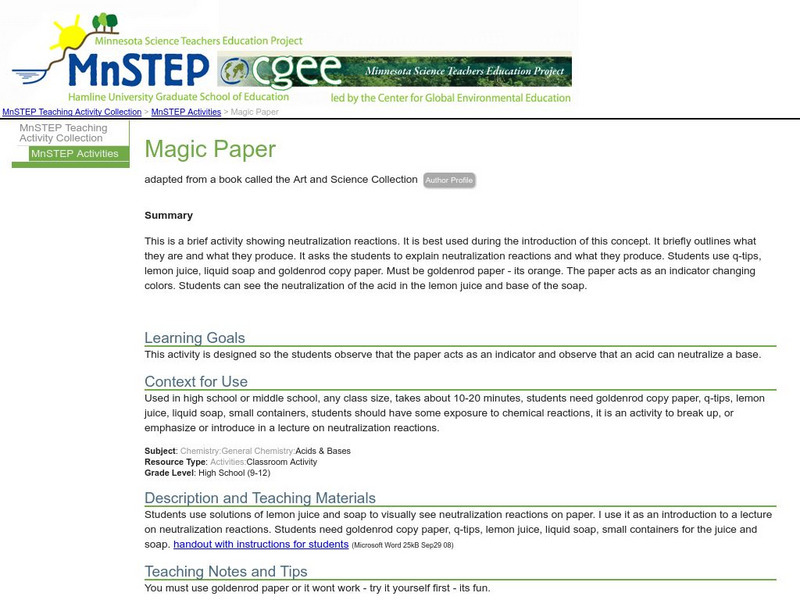Utah Education Network
Uen: Balancing Act
Students will use wooden atoms to model and balance a chemical reaction.
OpenSciEd
Open Sci Ed: 7.1 Chemical Reactions & Matter Transformations
This Chemical Reactions & Matter Transformationsun unit has students investigating where the students investigate the chemical reactions of a bath bomb.
Children's Museum
The Children's Museum of Indianapolis: Exploding Baggies
Young scholars will witness a fascinating chemical reaction and learn how to identify when a reaction has occurred by combining simple ingredients.
Open Ed
Open Ed Sci: 7.2 Chemical Reactions & Energy
In this 21-day unit, students are introduced to the anchoring phenomenon-a flameless heater in a Meal, Ready-to-Eat (MRE) that provides hot food to people by just adding water. They complete investigations to collect evidence to support...
Chiral Publishing
Chiral Publishing: An Introduction to Chemistry: Chemical Calculations and Chemical Equations [Pdf]
This chapter on chemical calculations and equations focuses on equation stoichiometry. Learn how to convert masses, use limiting reactants, and calculate the molarity of a solution.
Exploratorium
Exploratorium: Copper Caper
A nice little activity where students make dull pennies shiny again using vinegar and salt.
California State University
Csudh Project for Chemistry: Mass, Moles, and Gfw
Several basic problems dealing with the relationships between mass, moles, and the GFW.
Scholastic
Scholastic: Dirtmeister's Science Lab: Egg Citing Science: Acids and Bases
An simple experiment that will allow students to observe the effects of acids and bases on an egg and to then discuss what these observations tells us about larger issues, like acid rain.
Savvas Learning
Chemistry: Central Science Live: Properties of Solutions
This site provides an excellent overview of the solution process. Content includes a focus on how a solution is formed, energy changes and solution formation, spontaneity and disorder, and solution formation and chemical reactions.
Texas Instruments
Texas Instruments: Identifying and Balancing Chemical Equations
This StudyCard stack will allow students to review balancing and classifying chemical equations.
Texas Instruments
Texas Instruments: Keep It Bottled Up: Linear Rates of Pressure Increase
When two or more chemicals react, other substances such as gases may be produced. The rate at which the reaction takes place can be affected by a number of different factors including temperature. In this activity, you will see how...
Texas Instruments
Texas Instruments: Chemical Reactions
This activity is designed to be used a pre-test over types of chemical reactions and balancing.
Texas Instruments
Texas Instruments: Enthalpy of an Ion
In this activity you will: Explore exothemic and endothermic reactions. Create a classroom calorimeter to measure energy of a reaction.
Science Education Resource Center at Carleton College
Serc: Chemical Reactions: Investigating Exothermic and Endothermic Reactions
In this 9th grade physical science guided inquiry, students will work in pairs to discover the indicators of chemical reactions. Each pair of students is assigned either an exothermic or endothermic reaction. Based on their observations,...
Science Education Resource Center at Carleton College
Serc: Combustion or Oxidation
Students burn a magnesium strip to reinforce the concepts of chemical vs. physical changes, reaction types, conservation of mass, formulas and equations, stoichiometry, Lewis structures, and to explore the concept of oxidation/reduction...
Science Education Resource Center at Carleton College
Serc: Molar Volume of a Gas Determined via a Reaction
During this experiment, students will react magnesium with hydrochloric acid to produce hydrogen gas which is collected inside a flask that has a Vernier Gas Pressure Sensor connected to it in order to determine the molar volume of a...
Science Education Resource Center at Carleton College
Serc: Qualitative Analysis: Guided Inquiry
In this experiment, students will design and carry out a sequence of chemical reactions for the separation and identification of three metal cations from six unknown samples.
Science Education Resource Center at Carleton College
Serc: Hydrogen Oxygen Rockets
Students investigate how to build and launch a simple rocket that uses hydrogen and oxygen gases that will be mixed to propel the rocket. Students learn the principles of combustion reactions, kinetics, stoichiometry of reactions,...
Science Education Resource Center at Carleton College
Serc: Observing,describing, Measuring Changing Physical Prop: Making Ice Cream
Students will create an endothermic chemical reaction by making ice cream. They will observe, describe, and measure the ingredients. After making ice cream, students will measure the temperature of the ice cream and the ice/salt mixture....
Science Education Resource Center at Carleton College
Serc: Maximizing Displacement: Mass, Volume and Density
This problem-solving activity demonstrates the concepts of mass, volume, and density and how they relate to displacement.
Science Education Resource Center at Carleton College
Serc: Chemical Reactions and Pancakes
In this lesson plan, students will hear a story about the ingredients that go into pancakes called, "Pancakes, Pancakes!" by Eric Carle. We will then discuss preference of light and fluffy vs. flat and rubbery pancakes. Students will...
Science Education Resource Center at Carleton College
Serc: Mn Step: Student Chemical Reactions Demonstrations
A lab activity where students conduct and analyze assigned chemical reactions, then demonstrate and explain them to the class. Comprehensive lab handouts are included.
Science Education Resource Center at Carleton College
Serc: Chemical Changes: Reacting an Acid and Base
In this chemistry lab, students will investigate chemical changes that occur when acids and bases react. It is meant to introduce the concepts of chemical changes, gases have mass, conservation of mass, and balancing equations. Students...
Science Education Resource Center at Carleton College
Serc: Magic Paper
This lesson serves as an introduction to neutralization reactions. Students will observe that the goldenrod copy paper acts as an indicator changing colors and also that an acid can neutralize a base.




